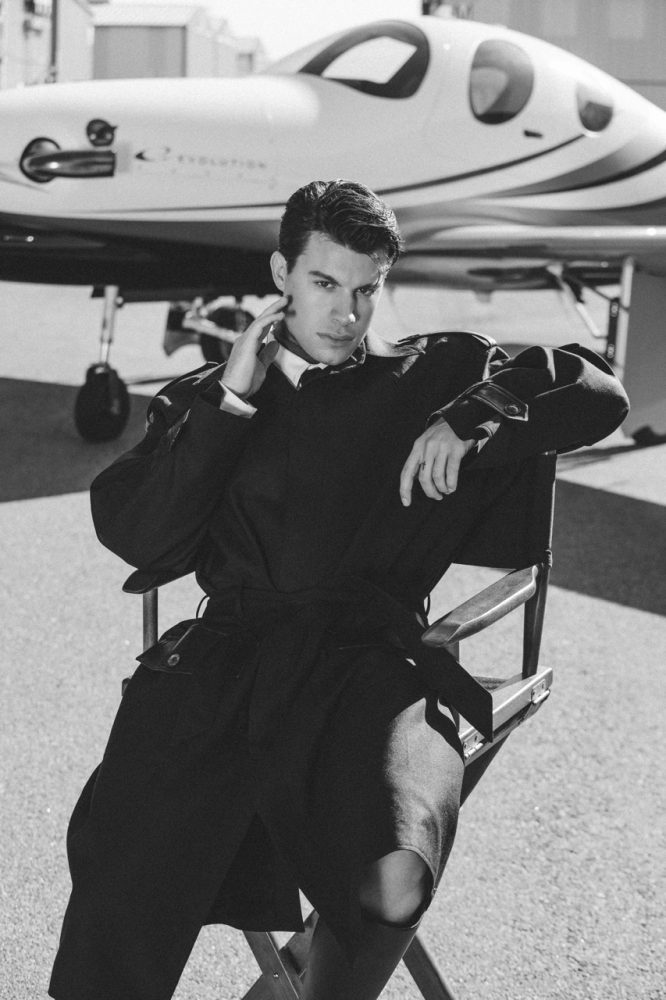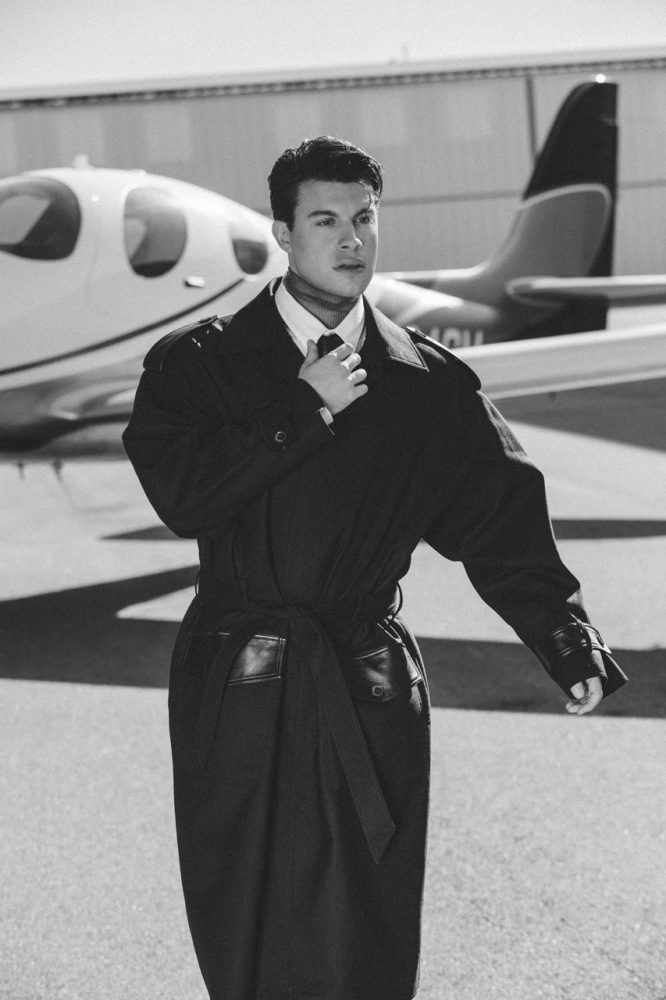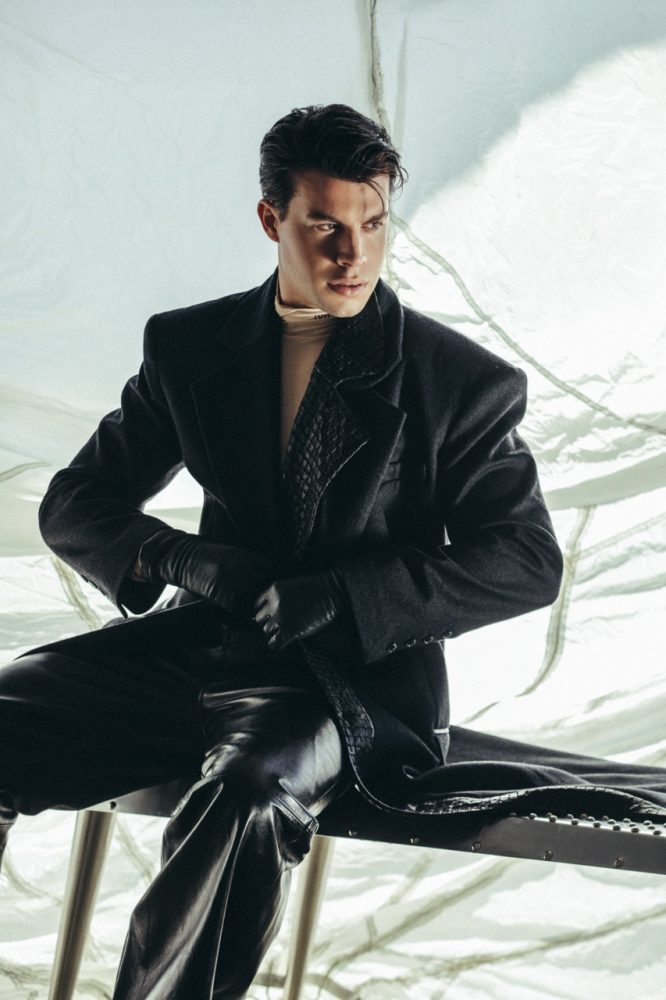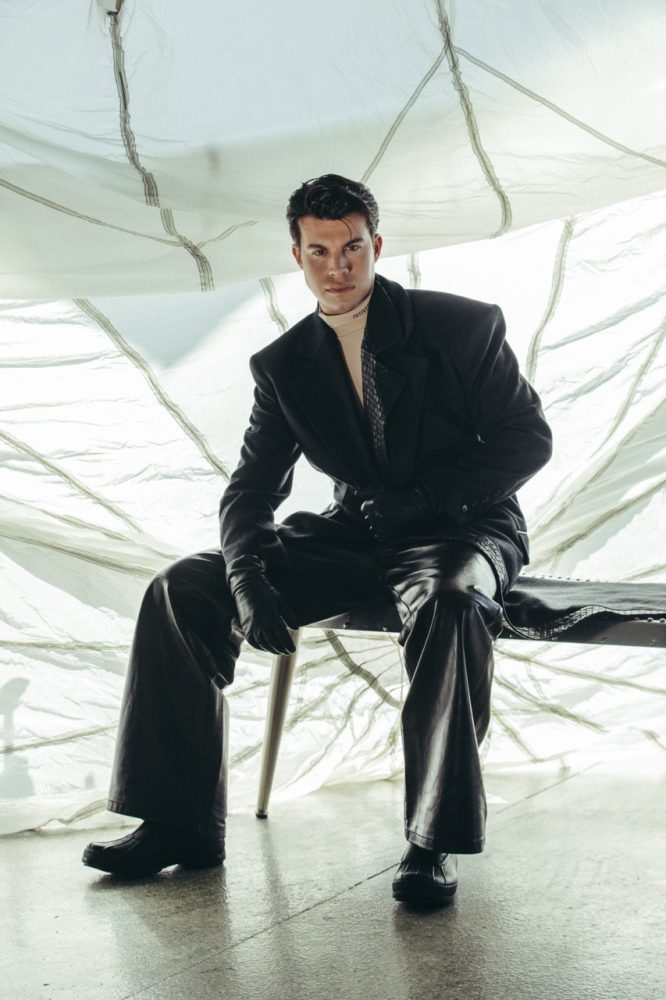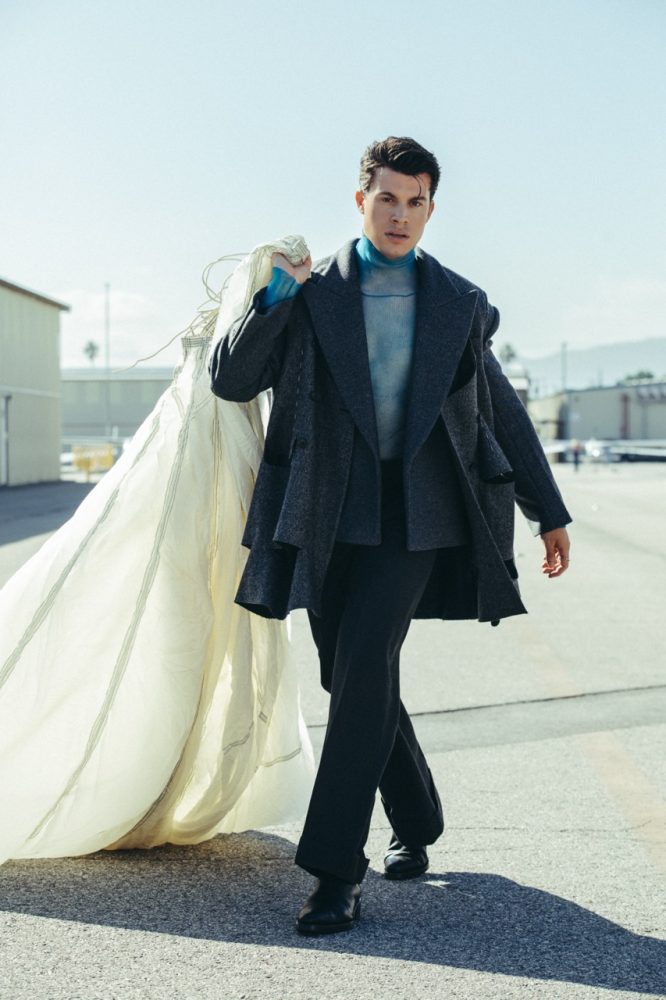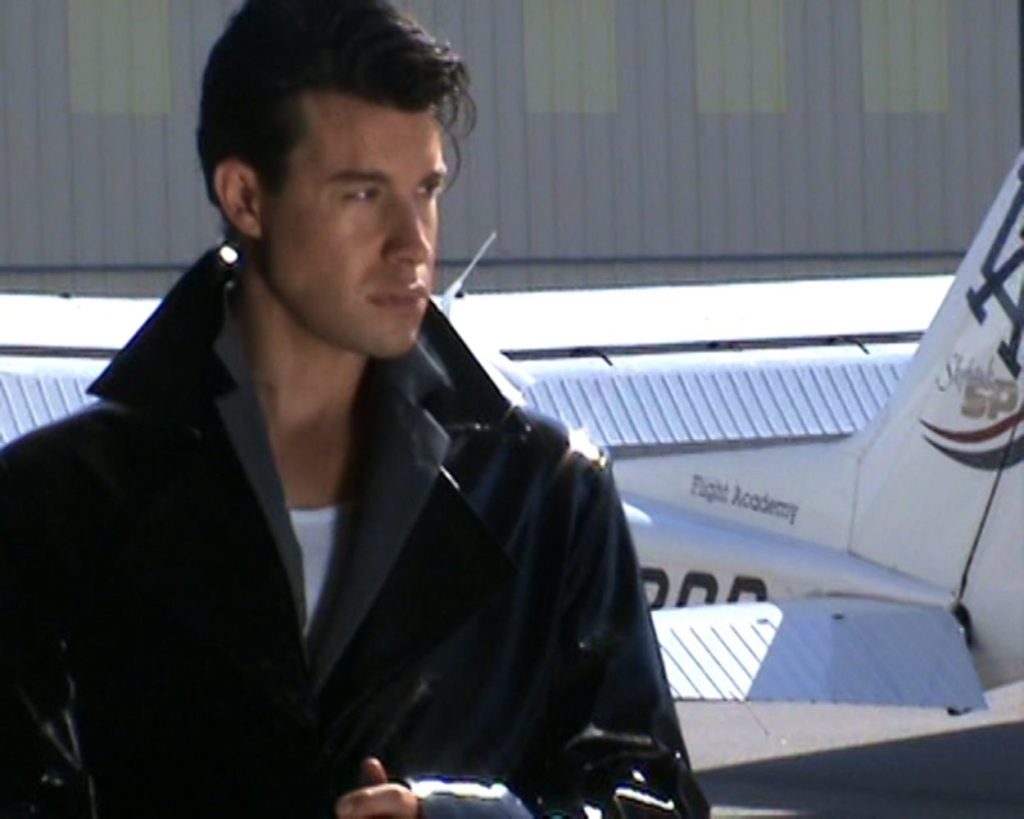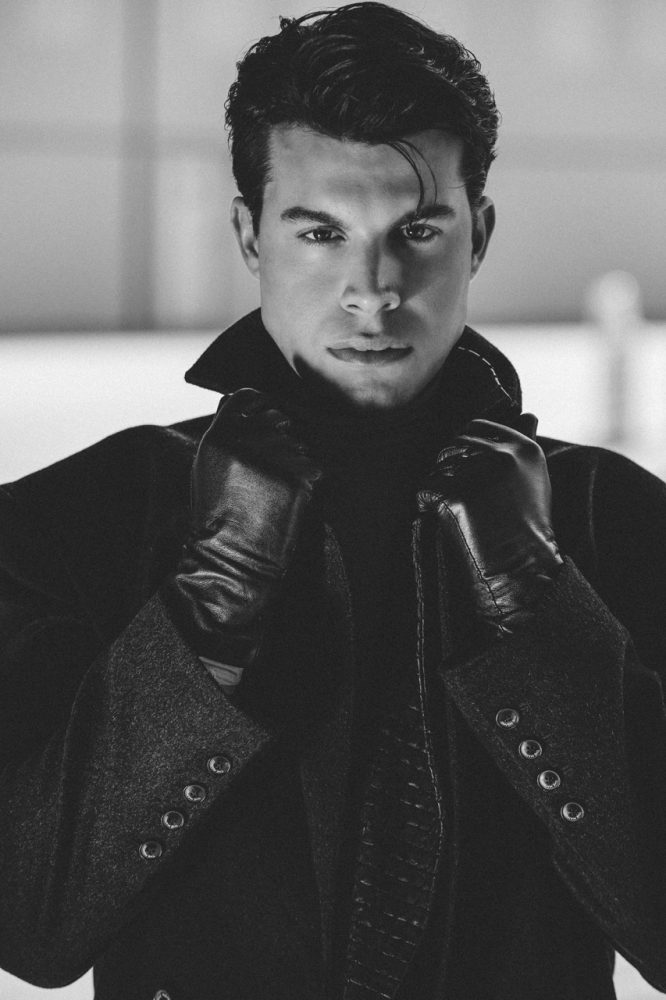
- Andrew Matarazzo wears THE MANNEI coat, TRUSSARDI shirt, MAISON MARGIELA turtleneck and shoes.
- Andrew Matarazzo wears THE MANNEI coat, TRUSSARDI shirt, MAISON MARGIELA turtleneck and shoes.
Actor and author Andrew Matarazzo brings his gripping BEDLAM trilogy to a powerful close with the release of ZENITH, the emotional, action-packed finale following BEDLAM (Book 1) and SWEVEN (Book 2). Set in a fractured world torn apart by a devastating virus, The BEDLAM Trilogy follows a group of young survivors navigating loss, fear, and the chilling possibility that the outbreak was no accident.
The story began with BEDLAM, where readers met Tye, a young man forced to grow up fast in a parentless landscape, facing both the brutalities of the apocalypse and his own internal battles. The world has been overrun by terrifying creatures known as “Morts,” and Tye’s survival depends on trust, chosen family, and the fragile bonds forged through hardship.
In the follow-up, SWEVEN, the spotlight shifts to Willa, whose experience in the wasteland forces her to confront threats far beyond the creatures—greed, betrayal, and a shattering revelation about where the virus may have begun.
- Andrew Matarazzo wears THE MANNEI coat, COS top, ENTIRE STUDIOS pants, and BALENCIAGA shoes, CONCEPT FUSE brooch.
- Andrew Matarazzo wears COS top.
Now, with ZENITH, Matarazzo delivers the long-awaited conclusion. The word zenith itself signifies the climax, the highest point reached after an arduous climb, just before the inevitable fall. At nearly double the length of the earlier books, every trial, loss, and triumph converges as Tye, Willa, and their allies face powers far greater than themselves. Together, they must decide how much of themselves they’re willing to lose to save what’s left.
While ZENITH marks the end of the trilogy in print, it also signals a new beginning: Matarazzo has partnered with acclaimed showrunner Bradley Bredeweg, creator of Good Trouble and The Fosters (two of the most successful YA series in recent television history) to develop The BEDLAM Trilogy for the screen. The adaptation feels like a natural evolution; each chapter of the books already unfolds cinematically, reading like vivid episodes in an ongoing series.
Blending cinematic world-building with raw emotional depth, Matarazzo’s trilogy offers a fresh, human perspective on dystopian storytelling. ZENITH cements his reputation as a storyteller unafraid to explore the darkness of the world, and the light that survives within it.
- Andrew Matarazzo wears THE MANNEI coat, TRUSSARDI shirt, MAISON MARGIELA turtleneck.
- Andrew Matarazzo wears THE MANNEI coat, TRUSSARDI shirt, MAISON MARGIELA turtleneck.
- Andrew Matarazzo wears THE MANNEI jacket, COS turtleneck, CALVIN KLEIN pants, and BOTTEGA VENETA shoes.
ZENITH marks the end of a story that’s been building for years. What was going through your mind as you wrote the final chapters?
Something crazy happens when you’ve built a full world and characters over such a long period of time. It’s like it takes a life of its own, and I feel like it’s channeling through me, and I just pour it on the page. And with that comes this strange thing where I feel like I’m reading it from outside of myself. I’m yelling at the page, I’m crying with characters, I’m hoping something won’t happen—when I’m the one controlling it, but I feel like I’m not. It’s wild. It was very emotional writing the finale of such a long journey. I started the seeds of BEDLAM over fifteen years ago. I’ve lived with these characters for so long.
The word zenith means the peak before the fall—why did that title feel right for this final book?
People think the titles of my books are made-up words, but they’re actually all three very significant and real words. I remember having a note in my phone of “rare words,” and all three titles were in there. The craziest part was how they ended up having the same number of letters across all three titles, which was not done intentionally when I chose them. BEDLAM means a scene of chaos, and SWEVEN, a vivid dream.
- Andrew Matarazzo wears THE MANNEI coat, MM6 Maison Margiela turtleneck, SANDRO pants, and SPERRY shoes.
- Andrew Matarazzo wears THE MANNEI coat, MM6 Maison Margiela turtleneck, SANDRO pants, and SPERRY shoes.
- Andrew Matarazzo wears MAISON MARGIELA cape, turtleneck and pants, THE MANNEI coat, and JOHN VARVATOS shoes.
You’ve said this book is double the size of the first two. What felt important to expand on as you closed the story?
It just landed that way because the book toggles between our two heroes’ POVs, so it’s essentially two books, from each of their perspectives, coming together as one finale. I didn’t set out with a limit; I just fleshed out all the story points until they naturally ended where I felt they needed to. I’m really, really proud of this one.
You started out as an actor. What inspired you to make the leap into writing novels—and especially a dystopian trilogy?
I think the spirit of being an actor is being a storyteller, so writing feels like an extension of that need. I always wrote short stories and even comics very early in my school years, and BEDLAM just happened to be an idea that compelled me enough to see it through. The lockdown gave me a rare opportunity where I had nothing but time and mental bandwidth to tackle it, and of course, the genre of the book felt relevant to the events happening in real life. Once I saw the first book was getting great reviews, I felt really motivated to continue, and it very much felt like there was a lot left to explore in this world I made.
The trilogy begins as a story of survival but ends as something much larger in scope. What changed in your perspective as you wrote it?
It felt like a natural progression. It starts from the perspective of these young characters who only know what they know and can’t possibly have a full picture of the evils in the world that they’re vulnerable to. It’s very much like real life, when we hear whispers of things and years later a massive, complex story unravels itself. We are just collateral damage of larger systems. I wanted the books to feel like that, that as the characters come into themselves, they learn more and become empowered to tackle more.
It’s crazy how people often think I’m making direct analogies to current real-life events, but it’s never intentional. What’s happening is that our reality is just getting closer to the kinds of things we once only found in fiction. It’s haunting, actually.
What excites you most about translating the world of BEDLAM from page to screen?
I am so unbelievably passionate about what I have in my hands. I know when people see a young person writing their own book or trying to make a show, there’s a bit of an eye roll, and they just assume it’s “another one of those.” People are quicker to support the work of total strangers who are seemingly successful than that of a young independent artist. But I have a very clear vision of taking a familiar genre and doing something with it that I’ve personally never seen done. It’s not even just the story or the premise, it’s how it will be executed creatively — the choices, the style. That’s the part I’m excited about. I’m confident, despite what the outward opinions might be.
- Andrew Matarazzo wears SALT MURPHY coat, TRUSSARDI jacket, CALVIN KLEIN top, and BOTTEGA VENETA shoes.
- Lionet Photographed by David-Simon Dayan.









